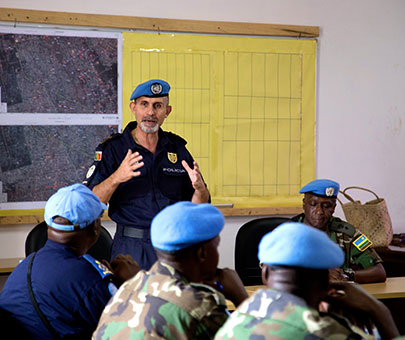Election Management Training Course (EMT 25)
Conflict Management

Course Fee: The Course is Core Funded. Tuition, accommodation, food will be provided by Kaiptc Participants will have to bear the cost for their travel and health insurance. Additionally, participants will pay a commitment fee of USD 1000 or equivalent per head.
Terms and Conditions:
AS part of the covid-19 measures by the Kaiptc, all participants are to travel with a travel medical insurance covering covid-19 treatment and must be valid for an additional 2 weeks after the course end date. Covid guidelines of the Centre must be strictly followed. The Kaiptc does not accept any responsibility for medical treatment and travel or other insurance.
| In short | |
| Course Date/Duration | 14 – 25 July 25 |
| Course Capacity | 30 participants |
| Target Group | Civilian, Police, Military ( see details below) |
| Course Language | English |
| Application Deadline | 30 March 2025 |
Introduction/Background
As the push for democracy and good governance continue to make inroads into many countries in the developing world, so had the need for the organizing of credible and peaceful elections in most of these countries. Democratic elections are increasingly becoming the norm, a requirement and in many cases the preferred means of facilitating representation and participation in the political process and governance. Here in West Africa, the democratic prospects though uncertain at times, still looks promising.
Traditionally, responsibility for the successful management of elections has rested with the Electoral Management Bodies (EMBs) because of the centrality of their role as election administrators and the implications for professionalism in running elections. As a result, efforts at enhancing the efficiency of the organization and conduct of elections have tended to target the EMBs for capacity building. This approach largely ignores the crucial issue of citizen participation and thus overlooks their role as electoral stakeholders in managing elections. The KAIPTC Election Management training course is conceived as a contribution towards filling this training gap.
Course Goal/Aim/Objectives
The objective of the training is to enhance the capacities of electoral stakeholders in understanding and managing elections. The overall purpose will be to provide participants with the knowledge and competencies on election management.
Target Group
As noted above, the course is designed not just for the benefit of the EMBs, but for all the diverse stakeholders with high stakes in the electoral process. These include:
- Civil Society Actors – networks/national & international NGOs/media/youth groups/women’s groups/religious groups/traditional institutions
- Security Personnel
- Government Organs – relevant government institutions / ministries / departments and agencies
- Political Parties
- Election Observation groups
- Regional Economic Communities – personnel from the electoral assistance units
- Election Management Bodies – training and operations departments.
Expected Outcome
As part of the civilian component of peace support operations, this course could serve to further enhance the contribution of civilians to peace operations in the West African region and beyond. The uniqueness of the course derives from its ability to mainstream the issues of conflict into the modules by clearly articulating the interface between the electoral cycle/process and conflict prevention or escalation. The course will thus contribute to providing participants with the tools/skills necessary for identifying and preventing election related disputes
Training Methodology
Facilitation will be interactive, using the collaborative problem-based learning approach. It will employ adult learning methods such as small group work/discussions, exercises, brainstorming, mini-lectures, panel discussions, case studies, research, and simulations
Modules of the course
- Standards and Principles of Election Administration
- The Legal Framework of Elections
- Electoral Systems
- Electoral Processes
- Electoral Operations
- Gender, Women and Elections
- Elections, Conflict and Security
- Election Monitoring and Evaluation
- Election Observation
- Election Dispute Resolution
- Electoral Integrity
- Stakeholder Management
Facilitators and Resource Persons
The course will use experienced resources persons from within Africa
Course Content
In order to help enhance participants’ knowledge and skills in the application of best practices in election management, the training will span the broad categories of Knowledge, Skills and Attitudes. Specific areas to be covered include among others:
Knowledge
- Standards and Principles of Election Administration
- The Legal Framework of Elections
- Electoral Systems
- Electoral Processes
- Electoral Operations
- Gender, Women and Elections
- Elections, Conflict and Security
Skills
- Election Monitoring and Evaluation
- Election Observation
- Election Dispute Resolution
Attitude
- Electoral Integrity
- Stakeholder Management
Selection Process
A selection team will meet to select possible participants who meet the eligibilty criteria
Interested applicants are kindly requested to click on the “How to Apply” button in order to fill and submit the online application form.
Contact at KAIPTC
| Auguster Ahorsey (Rtd)
Course Director Tel. 00 233 (0) 302 718200 Ext. 1034 Email: auguster.ahorsey@kaiptc.org
|

